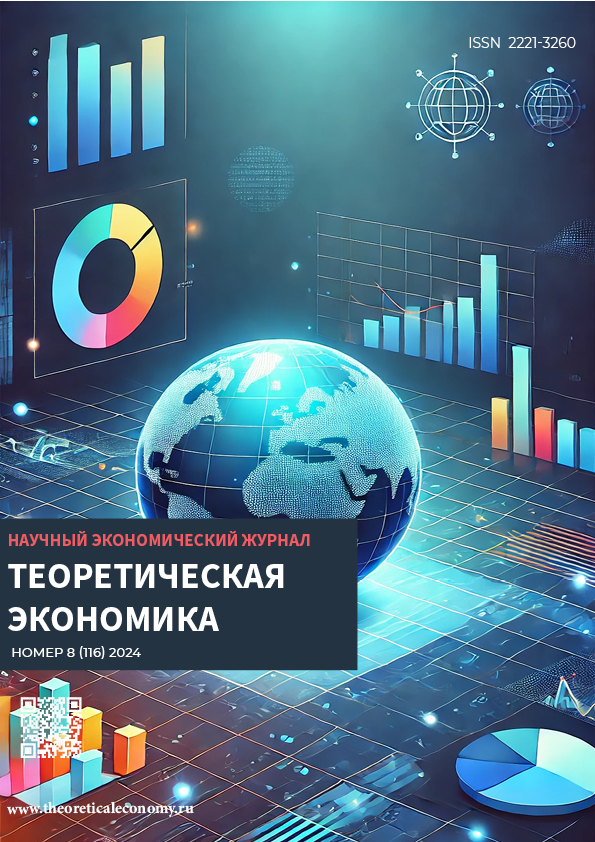Moskva, Moscow, Russian Federation
The consistent isolation of Russia from the global monetary and financial system and its inherent financial mechanisms determines the need to study the possibility and feasibility of their use in the existing geopolitical conditions. The purpose of the study is to determine the nature of the relationship between the main international financial mechanisms and the consequences of external influence on them with the use of sanctions. A new approach was used, in which the analysis of processes in the modern global monetary and financial system was carried out through the prism of the main international financial mechanisms. This approach not only provides another perspective on their consideration, but also allows us to identify new aspects of their relationships and mutual influence. During the research, methods of comparative logical and contextual analysis, systematization, classification and generalization were used. Based on a synthesis of the theory of financial mechanisms and the concept of global liquidity, the relationship of key international financial mechanisms, as well as the role of international reserves, is shown. As a result of the study, it was concluded that it is impossible for Russia to use existing international financial mechanisms controlled by the United States under sanctions and the need to create new regional digital financial mechanisms with the participation of the EAEU countries and the BRICS states.
international financial mechanisms; international financial relations; global monetary and financial system; global liquidity; international reserves.
1. Rossiya v mirovoy finansovoy arhitekture / P. V. Alekseev, V. V. Antropov, V. Yu. Barabanov [i dr.]. – Moskva: INFRA-M, 2023.– 203 s. . – DOIhttps://doi.org/10.12737/1984071.
2. Krylova L.V., Mudrecov A.F., Prudnikova A.A.. Znachenie mezhdunarodnyh rezervov v global'noy sisteme antikrizisnogo finansirovaniya // Problemy prognozirovaniya. 2024. № 3 (204). S. 141–150. DOI:https://doi.org/10.47711/0868-6351-204-141-150
3. Hurwicz L. But Who Will Guard The Guardians? //American Economic Review. 2008. Vol. 98. № 3. Pr. 577–85. DOI:https://doi.org/10.1257/aer.98.3.577
4. Maskin E. Mechanism design: how to implement social goals. Nobel Prize lecture/ December 8. 2007. URL: https://www.nobelprize.org/uploads/2018/06/maskin_lecture.pdf
5. Myerson R. Perspectives on Mechanism design in economic theory // American Economic Review. 2008. Vol. 98. №. 3. Pp. 586–603. DOI:https://doi.org/10.1257/aer.98.3.586.
6. Burlachkov V.K., Golovnin M. Yu., Tihonov A.O. Global'naya denezhnaya likvidnost': teoreticheskie osnovy, pokazateli, tendencii dinamiki // Den'gi i kredit. 2017. № 12. S. 3-8. Burlachkov V.K., Golovnin M. Yu., Tixonov A.O. Globalnaya denezhnaya likvidnost: teoreticheskie osnovy, pokazateli, tendencii dinamiki // Dengi i kredit. 2017. No. 12. S 3-8. (In Russ.)].
7. Bank mezhdunarodnyh raschetov. URL: https://www.bis.org/statistics/about_gli_stats.htm?m=2689
8. Bank mezhdunarodnyh raschetov. URL: https://www.bis.org/statistics/gli2404.htm
9. Global liquidity – concept, measurement and policy implications. Committee on the global financial system. Bank for International Settlements, CGFS Papers. 2011. No. 45. https://www.bis.org/publ/cgfs45.pdf (data obrascheniya 11.04.2024).
10. Krylova L. V. Decentralizaciya mirovoy valyutno-finansovoy sistemy v usloviyah deglobalizacii // Bankovskie uslugi. 2022. № 7. S. 2–8. DOI:https://doi.org/10.36992/2075-1915_2022_7_2
11. Kuznecov A. V . Imperativy transformacii mirovoy valyutno-finansovoy sistemy v usloviyah mnogopolyarnosti // Finansy: teoriya i praktika. 2022. T. 26. №2. S. 190-203. DOI:https://doi.org/10.26794/2587-5671-2022-26-2-190-203
12. Krylova L. V. Sankcii kak novaya real'nost' mirovoy ekonomiki // Mirovaya ekonomika i mirovye finansy. 2024. T.3. № 2. S. 5–10. DOI:https://doi.org/10.24412/2949-6454-2024-0130
13. Annual Economic Report, Bank for International Settlements, June 2020. URL: www.bis.org/publ/arpdf/ar2020e.htm. S. 47. (data obrascheniya 11.04.2024).
14. URL: https://www.societegenerale.com/en/banking-explained/financing-the-economy/disintermediation (data obrascheniya 11.04.2024).
15. Global Monitoring Report on Non-Bank Financial Intermediation. FSB. 2023. https://www.fsb.org/wp-content/uploads/P181223.pdf. (data obrascheniya 11.04.2024).
16. https://www.tbank.ru/invest/social/profile/MegaStrategy/52d89411-e35b-4cf7-af3b-b91dc77f34a5/ (data obrascheniya 11.04.2024).
17. https://eadaily.com/ru/news/2024/02/14/briks-obhodit-g7-dolya-v-mirovom-vvp-semerki-snizhaetsya (data obrascheniya 11.07.2024).
18. Kuznecov A.V. Reorganizaciya mirovoy valyutno-finansovoy sistemy v kontekste stabilizacii global'noy ekonomiki / A.V. Kuznecov. - DOIhttps://doi.org/10.52957/22213260_2022_8_74. - Tekst : elektronnyy // Teoreticheskaya ekonomika. - 2022 - №8. - S.74-83. - URL: http://www.theoreticaleconomy.ru (Data publikacii: 30.08.2022)
19. Golub Yu.G., Shenin S.Yu. Transatlantizm v kontekste zakata globalizacii: diskussii v SShA // Mirovaya ekonomika i mezhdunarodnye otnosheniya. 2023. T. 67. № 8. S. 60–69. – DOIhttps://doi.org/10.20542/0131-2227-2023-67-8-60-69.
20. Fedulova M., Chernyad'ev D., Porshakov A. Perestroyka global'nyh proizvodstvennyh cepochek: ot effektivnosti k ustoychivosti. Bank Rossii. Yanvar' 2022. URL: https://www.cbr.ru/Content/Document/File/132380/analytic_note_20220125_dip.pdf (data obrascheniya 11.04.2024).
21. Sapir Zh. Nahodimsya li my na poroge masshtabnoy transformacii mirovoy ekonomiki? // Problemy prognozirovaniya. 2020. №6 (183). S. 27–45.
 This work is licensed under Creative Commons Attribution-NonCommercial-NoDerivatives 4.0 International
This work is licensed under Creative Commons Attribution-NonCommercial-NoDerivatives 4.0 International


















